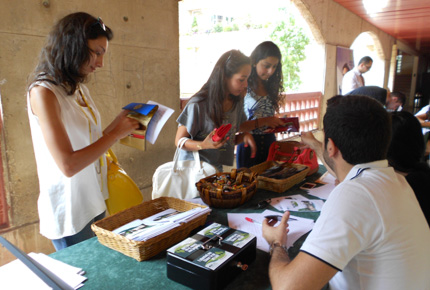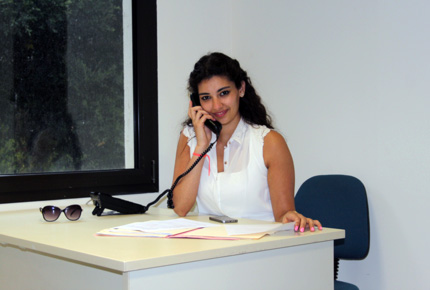Maintaining a culture of fundraising
LAU Advancement and Development divisions tell us about the impact of the economic crisis on philanthropy in higher education.

The Plant Your Class Tree initiative invites graduating students to pay $10 towards a scholarship for students in need.
The ongoing global economic instability has seen philanthropic capital in higher education decline, prompting university fundraisers to exert more efforts to attract existing funds.
“In a time of economic crisis, fundraising becomes more challenging and one has to be creative and innovative to achieve the desired target,” says Nassib Nasr, assistant vice president for Development at LAU. “This decade is not for education but for innovation,” he adds.
Nasr cites the example of a recent LAU initiative in this regard, namely, the establishment of the Mu’taz and Rada Sawwaf Master’s in Islamic Art and Architecture, made possible by a generous endowment from Mu’taz Sawwaf. The innovative degree is “new to Lebanon,” says Nasr, with the closest competing program located in Cairo.
According to Lana Abou Teen, LAU associate director of Development, other fundraising achievements include a senior class gift campaign started by the university three years ago, whereby graduating students are asked to contribute $10 each towards financial aid for future students in a bid to emphasize the importance of philanthropy in their lives. “We also have a plan to engage students in such a scheme as they enter university to further instigate a culture of philanthropy, which we don’t have in our society,” Teen says.
For Marla Rice-Evans, LAU’s vice president for Advancement, alumni networks play a vital role in supporting fundraising efforts. For instance, LAU’s ongoing “Fulfilling the Promise” campaign has revised its goals to achieve $100 million in donations by the last day of 2016, an ambition requiring reaching out to alumni all over the world. “That’s a gigantic job because we have alumni in 88 countries,” says Rice-Evans, adding, “I really want us to see that we have enough tools to reach out to all those people.”
Rice-Evans believes that philanthropy is a science of its own: “The techniques that you use to reach your alumni and attract their attention to the message they are receiving is a kind of the science of data management.” Likewise, Abou Teen says philanthropy is a science in which one can make estimations and predict the target to be raised at the end of the year.
But the ongoing economic crisis has made the process more difficult. According to Nasr, “the crisis has pushed the private sector to reduce its budget for donations and Corporate Social Responsibility.” He goes on to explain that donations by corporate entities started dropping with the beginning of the crisis in 2008, picking up in 2011 but still not reaching pre-crisis previous levels.
The crisis has seen a drop in Americans’ donations to education by 19 percent from $47.97 billion in 2007 to $38.84 billion in 2008, according to a study conducted by Giving USA. However, the study adds that the year 2013 witnessed a pick-up in donations to education in general to $52.07, billion including $33.8 billion granted to higher education. As for donations to higher education in 2014, they saw an increase of 10.8 percent to $38 billion, according to an annual survey by the Council for Aid to Education.
In the case of LAU, last year a number of major donors declined to renew their support for financial aid beyond students in the graduating class. “But we never give up,” says Abou Teen. “When we hear of someone doing great in business we try to make the connection and we have many cases of such prospects who became donors.” Nasr concurs with this positive note, saying, “Maintaining a steady number of donors allows us to replace any shortage from certain contributors right away.”
More
Latest Stories
- Into the Psychology of Justice
- Alumnus Zak Kassas on Navigation, Spoofing and the Future of GPS
- Hearing Between the Lines
- LAU Hematology Conference 2025: Advancing Science Through Interdisciplinary Exchange
- Dr. Chaouki T. Abdallah Invested as LAU’s 10th President
- LAU Guides Its Students Through the Code of Conduct
- Innovative Procedure at LAU Medical Center–Rizk Hospital Signals Hope for a Patient With a Congenital Disease
- LAU’s Inaugural PodChat Session Addresses AI Detection in the Classroom


